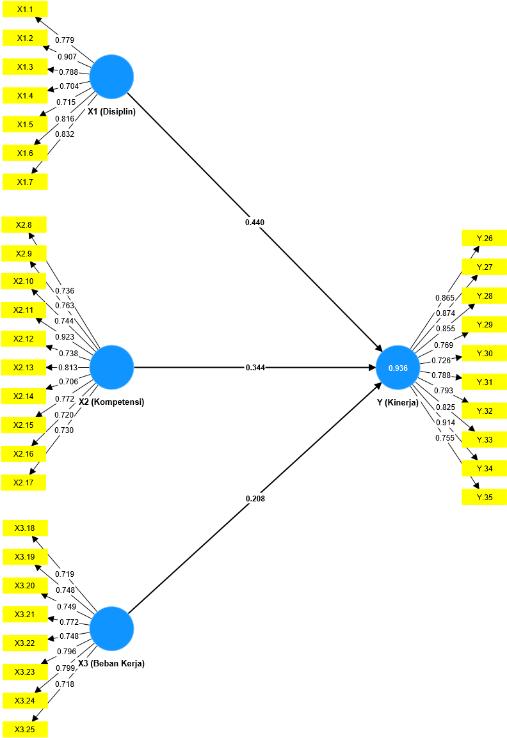Analysis of the Influence of Discipline, Competence and Workload on the Employee Performance at Kelas Pintar Startup
DOI:
https://doi.org/10.5555/ijosmas.v5i1.381Keywords:
Discipline, Competence, Workload, PerformanceAbstract
: Kelas Pintar is a technology-based educational solution designed to increase students' understanding of subject matter and aims to improve the quality of human resources with the best educational reference for a better nation. To achieve this goal, maximum performance is required by employees. Therefore, the authors conducted research with the hypothesis that there is a significant influence between discipline, competence, and workload on the performance of Kelas Pintar Startup employees. The purpose of this study was to find out how much influence discipline, competence and workload have on the performance of Kelas Pintar Startup employees, both partially and simultaneously. The research method used is quantitative. The sampling technique used was proportionated stratified random sampling, where the sample was obtained by the portion of the population, namely 168 respondent. This research uses Structural Equation Modeling with Partial Least Square Technique (SEM-PLS). While the research analysis uses descriptive analysis, making path models, analyzing outer models, analyzing inner models, and testing hypotheses. The results of the study prove that the path coefficient (original sample) for discipline (X1) is 0.440 or 44%, competence is 0.344 or 34.4% and workload is 0.208 or 20.8%. So it can be interpreted that the variables of discipline, competence and workload have a significant positive effect on employee performance.
Downloads
References
Edison, E., Anwar, Y., & Komariah, I. 2017. Manajemen Sumber Daya Manusia, Bandung: Alfabeta
Prawirosentono, Suyadi. (1999). Kebijakan Kinerja Karyawan. (Kebijaksanaan Kerja Karyawan) BPFE, Yogyakarta.
Dito, T.R., Nidya, D. (2020). The Effect Motivation and Work Discipline on Employee Performance at Kelas Pintar Startup, Bandung
Gomez-Meija LR, David B Balkin, Robert L Cardy. (2010). Managing Human Resource. Pearson Education. Inc: New Jersey.
Hasto, K.H., Ratri, W (2018) Influence of Motiovation and Competence on Performance of Telkom Employees Directorate Human Capital Management, SCBTII, Bandung
Tsalisa, N.A., Nidya, D. (2020) The Effect of Work Family Conflict and Workload on Employee Performance (Case Study on Paramedic Workers of QIM Batang Hospital), 2020
Malayu S.P Hasibuan, 2006, Manajemen Sumber Daya Manusia, PT Bumi Angsara, Jakarta
Wibowo, (2017). Manajemen Kinerja. Jakarta: PT. Rajagrafindo Persada.
Abdullah Ma’ruf, (2014), Manajemen dan Evaluasi Kinerja Karyawan, Aswaja Pressindo: Yogyakarta.
Munandar, Ashar Sunyoto. (2011). Psikologi Industri Dan Organisasi. Universitas Indonesia, Jakarta
Utomo, (2008). Manajemen Sumber Daya Manusia, Penerbit Arcan, Jakarta.
Mangkunegara, A.A.P. (2009). Evaluasi Kinerja Sumber Daya Manusia. Bandung : PT Refika Aditama.
Hair, J. F., Sarstedt, M., Ringle, C. M., & Gudergan, S.P. (2018). Advanced Issues in Partial Least Squares Structural Equation Modeling (PLS-SEM). Sage.
Calvin, W., Hendra, N., Eddy, S., Rikky. (2020) Pengaruh Disiplin Kerja, Kompetensi Kerja dan Kepuasan Kerja terhadap Kinerja Karyawan Pada PT. Kedaung Medan Industrial, Jurnal Manajemen LMII, Medan.
I Made, S., Putu, K.M., I Ketut, S.S., Ni Kadek, S. (2020). The Effect of Leadership Style and Competence on Employee Performance, EJBMR, Europe.
Reynald. (2015). Pengaruh Etos Kerja, Budaya Organisasi, Dan Beban Kerja Terhadap Kinerja Pegawai Di Dinas Pekerjaan Umum Minahasa Selatan. Jurnal EMBA, 3(3), 1196-1207







